- Home
- John Jakes
Love and War Page 2
Love and War Read online
Page 2
The Mains and Hazards got to know one another, as Northern and Southern families often did in those years while the long fuse of sectionalism burned down to the powder of secession. There had been visits exchanged, alliances formed—hatreds, too. Even George and Orry had seriously quarreled. George was visiting at the Main plantation, Mont Royal, when a slave ran away, was caught, then cruelly punished on orders from Orry’s father. The argument of the two young men afterward was the closest they ever came to seeing their friendship destroyed by the divisiveness dripping into the country’s bloodstream like a slow poison.
The Mexican War, which found the two friends serving as lieutenants in the same infantry regiment, finally separated them in unexpected ways. An encounter with Captain “Butcher” Bent sent George and Orry into action on the Churubusco Road, where a shell fragment destroyed Orry’s left arm and his dreams of a career. Not long after, news of the death of the senior Hazard called George home, because his mother, with sound instincts, could not trust George’s older brother, Stanley, to be a wise steward of the immense family business. Soon after taking charge of Hazard’s, George wrested control of the ironworks from his ambitious, irresponsible brother.
Amputation of Orry’s left arm put him in a brooding, reclusive mood for a time. But as he trained himself to run the plantation and perform two-handed tasks with one, his outlook revived and the friendship with George renewed itself. Orry stood up as best man when George married Constance Flynn, the Roman Catholic girl he’d met in Texas while en route to Mexico. Then George’s younger brother, Billy, decided he wanted to attend the Academy, while Orry, desperately seeking some way to save his orphaned young cousin Charles from a wastrel’s life, persuaded him to seek an Academy appointment. The friendship of Charles Main and Billy Hazard, already acquainted, soon replicated that of the two old grads.
In the last decade of peace, many Northerners and Southerners, despite ever fiercer rhetoric, ever sharper threats from political leaders and public figures on both sides, remained personal friends. It was so with these two families. Mains came North, Hazards traveled South—though not without difficulties in each case.
George’s sister, Virgilia, who had carried her passionate abolitionism across an invisible line into extremism, had nearly undone the friendship. During a Hazard family visit to the Main plantation, she’d met a slave belonging to the man who later married Orry’s sister, Ashton. Virgilia encouraged the slave to run away. When he did, he succeeded.
Ashton Main, beautiful and unprincipled, had fancied Billy for a while, but he soon saw the fine and genuine qualities of Ashton’s younger sister, Brett. As headstrong and crazed as Virgilia in some ways, the rejected Ashton had waited for her moment of vengeance; she conspired to have Billy murdered in a trumped-up duel not two hours after he married Brett at Mont Royal. Cousin Charles had dealt with that plot in his direct cavalry officer’s way—rather violent, it was—and Orry banished Ashton and her fire-eater husband, James Huntoon, from Main land forever.
Virgilia’s black lover, the slave whose escape she’d assisted, had been slain with others of John Brown’s murderous gang at Harpers Ferry. Virgilia, at the scene and panic-stricken, had fled back home and was thus at Belvedere the night Orry made his perilous visit. It was this visit and the circumstances leading to it that a grieved and thoughtful George pondered as he rode up the last bit of steep road to Belvedere.
Orry’s iconoclastic older brother, Cooper, had usually disagreed with most Southerners regarding their peculiar institution. In contrast to an economy based on the land, and the working of it by human property, he pointed to the example of the North—not perfect by any means, but in step with the new world-wide age of industrialism. In the North, free workers were speeding into a prosperous future to the hum of machines, not dragging a load of rusty methods and ideologies as heavy as wrist cuffs and leg manacles, and fully as hampering. As for the traditional apology of Cooper’s state and region—that slaves were more secure, therefore happier, than Northern factory workers fastened by invisible chains to huge, hammering machines—he laughed that off. A factory worker might indeed starve to death on what the owners paid him. But he could not be bought or sold like mere chattel. He could always walk away, and no posse would ride in pursuit; no laborer would be recaptured, flogged, and hung from the flywheel of his great engine.
Cooper sought to establish a shipbuilding industry in Charleston and had envisioned, even started to construct, a huge iron vessel patterned after one designed by the British engineering genius Brunel. George had put capital into the venture, as much for the sake of friendship and belief in Cooper’s principles as for the possibility of quick profit, which was slim.
In the final days of Sumter’s survival as a Union bastion, with war no longer a doubtful question, Orry had gathered up as much cash as he could by mortgaging family property. It amounted to six hundred fifty thousand dollars of the original one million nine hundred thousand George had invested. Despite Orry’s pronounced Southern accent, he had undertaken to carry the money to Lehigh Station in a small, plain satchel, by train. The risk was enormous, yet he came. Because of his friendship and because of a debt of honor.
The night the two friends met, Virgilia furtively summoned the mob—most certainly to lynch the visitor. But the attempt failed, and Orry had gotten safely on a late train and now was—where? South Carolina? If he had reached home safely, he had at least one chance for happiness. Madeline LaMotte, the woman whom Orry had loved, as she had loved him despite her imprisonment in a disastrous marriage, had rushed to Mont Royal to warn of the conspiracy against Billy’s life. Once there, in defiance of the husband who had deliberately and systematically mistreated her for years, she stayed.
The aftermath of Sumter forced other decisions, however uncertain or emotional. Charles had enlisted in a South Carolina legion of cavalry after resigning from the United States Army. His best friend, Billy, remained with the Union engineers. And Billy’s Southern-born wife, Brett, was living in Lehigh Station. The personal world of the Mains and the Hazards hung in a precarious balance as massive, threatening, unpredictable forces gathered.
It was that fact which George had been shunning these past fourteen days. Life was fragile. Friendship the same. Before parting, he and Orry had pledged that the war would never sunder the bonds between them. In this night’s remembered ugliness, shrieks of pain, geysers of fire, George wondered whether they were naïve. He felt, almost wildly, that he must do something to reaffirm his dedication to defending the ties.
He stabled his horse and went directly to Belvedere’s library, a vast room with smells of leather and fine book papers. It was as silent as the night house.
When he crossed toward his desk, he spied a memento always kept on an otherwise bare refectory table. It was a conical object, rough-textured, measuring six inches from apex to base. The dark brown color indicated heavy iron content.
He realized why it had attracted his eye. Someone—a maid, probably—had moved the object from its customary position. He picked up the meteorite and continued to hold it while he envisioned the place in the past where he’d found it—the hills around West Point during his cadet days.
What lay in his hand was a piece of a much larger meteorite that had traveled through starry dark, and distances beyond his power to comprehend. Star-iron, the old men of the trade—his ancestors—called it. Known since the pharaohs ruled the Nile kingdoms.
Iron. The most potent stuff in the universe. The raw material for building civilization, or leveling it. From iron came the immense death weapons George planned to cast for a whole battery of reasons: patriotism, hatred of slavery, profit, a paternal responsibility for those who worked for him.
What lay in his hand was, in its way, war. He replaced it on the table precisely where it belonged, but he did so quickly.
He lit the gas mantle above the desk. Opened the lower drawer in which he had put the small, plain satchel—for remembrance. He looked at the s
atchel a while. Then, out of profound emotion, he inked a pen and wrote with great speed.
My dear Orry,
When you returned this valise, you performed an act of supreme decency and courage. It is one I shall hope to repay in kind someday. But in case I do not—cannot—I place these words herein so you will know my intentions. Know most of all that I want to preserve the bonds of affection between us and our families which have grown and strengthened for so many years—want to, and have striven to, despite Virgilia, despite Ashton—despite the lessons about war’s nature which I learned in Mexico but forgot until tonight. I know you believe in the worth of this bond as much as I do. But it is fragile as a stalk of wheat before the iron scythe. If we fail to preserve what so richly merits preservation—or if some Hazard or Main falls, as, God pity us, some surely may if this conflict is anything other than brief—you will know I prized friendship to the last. Prized and never abandoned it. As I know you have not. I pray we meet when it ends, but if we do not, I bid you—from my deepest heart—an affectionate good-bye.
Your friend—
He started to inscribe the initial letter of his first name but then, with a swift, sad smile, wrote instead his West Point nickname. Stump.
He slowly folded the sheets; slowly placed them in the satchel and latched it; slowly closed the drawer and arose to the accompaniment of several irritating noises from his joints. Windows were open throughout Belvedere because of the warm night. He smelled the diminishing fetor of burning carried by the high wind. He felt cold and old as he put out the gas and wearily climbed the stairs.
Book One
A Vision From Scott
The flag which now flaunts the breeze here will float over the dome of the old Capitol at Washington before the first of May.
CONFEDERATE SECRETARY OF WAR
LEROY P. WALKER, speaking in Montgomery, Alabama, APRIL 1861
1
MORNING SUNSHINE DRENCHED THE pasture. Suddenly, at the far side, three black horses burst into sight at the summit of a low hill. Two more followed them over and down into the windblown grass, splendid coats shining, manes and tails streaming. Close behind the five appeared two mounted sergeants in hussar jackets heavy with braid. Riding at the gallop, great grins on their faces, the sergeants hallooed and waved their kepis at the black horses.
The sight immediately distracted Captain Charles Main’s troop of young South Carolina volunteers walking their matched bays in file along a road that meandered through the woods and farmlands of Prince William County. The three-day field exercise had taken them well north of their camp between Richmond and Ashland, but Charles felt a long ride was needed to sharpen the men. They were born riders and hunters; Colonel Hampton wanted no other kind in the cavalry units of the legion he’d raised in Columbia. But their reaction to the Poinsett Tactics, the unofficial name for the manual that had been the cavalryman’s textbook ever since ’41, ranged from restrained indifference to loud contempt.
“Deliver me from gentlemen soldiers,” Charles muttered as several of his men turned their mounts toward the rail fence separating road and pasture. The black horses veered, galloping beside the fence. The sweating sergeants chased them hard, speeding past the long line of troopers in trim gray jackets decorated with bright gilt buttons.
“Who are you, boys?” shouted Charles’s senior lieutenant, a stocky, cheery young man with red curls.
On the June breeze, blurred by hoofbeats, the answer came back: “Black Horse. Fauquier County.”
“Let’s give ’em a run, Charlie,” First Lieutenant Ambrose Pell yelled to his superior.
To stave off chaos, Charles reacted with a bellowed order. “Form twos—trot—march!”
The execution of the maneuver was so sloppy as to defy belief. The troop managed to straggle into a double file at the proper gait, then responded with whoops and much kepi-flourishing when Charles gave the order to gallop. But they were too late to catch the sergeants, who drove the five black horses away to the left, crossing the pasture and vanishing in a grove.
Envy stung Charles. If the noncoms indeed came from the Black Horse Cavalry he’d heard so much about, they had found some fine animals. He was dissatisfied with his own mount, Dasher, bought in Columbia. She came of good Carolina saddle-horse stock, but she was frequently balky. So far she didn’t live up to her name.
The road curved northeast, away from the fenced pasture. Charles reduced the gait to a trot, ignored another frivolous question from Ambrose, whom he had the professional misfortune to like, and wondered how in heaven he could forge a fighting unit from this assortment of aristocrats who called you by your first name, disdained all graduates of West Point, and tried to knock you down if you gave an order to which they objected. Twice since arriving at the bivouac down in Hanover County, Charles had resorted to his fists to curb disobedience.
In the Hampton Legion, his was a kind of misfit troop, consisting of men who’d come in from all parts of South Carolina. Nearly every one of the foot and mounted units in Hampton’s command had been raised in a single county, or even a single town. The man who put a company together generally won the election by which the volunteers chose their captain. There was no such familiarity and friendship to produce a similar outcome in Charles’s troop; his roster included boys from the mountains, the piedmont, even his own low country. This assortment called for a leader who possessed not only good family background but also plenty of experience with military organization. Ambrose Pell, who’d opposed Charles in the election, had the former but not the latter. And Wade Hampton had indicated his clear choice before the balloting. Even so, Charles won with only a two-vote margin. He was beginning to wish he’d electioneered for Ambrose.
With the sweet summer breeze bathing his face, and Dasher moving smoothly under him, however, he felt he might be too concerned with discipline. Thus far, the war was a lark. One Yankee general, Butler, had already been trounced in a sharp fight at Bethel Church. The Yankee capital, presided over by the Western politician many South Carolinians called “the gorilla,” was said to be a terrified village as deserted as Goldsmith’s. The main problem in the four troops of Hampton Legion cavalry seemed to be an epidemic of bellyaches brought on by too many fetes in Richmond.
All the volunteers had signed on for twelve months, but none of them believed this muss between the two governments would last ninety days. Inhaling the fragrance of sun-warmed grass and horseflesh, Charles, twenty-five, tall and ruggedly handsome and deeply browned, found it hard to believe there really was a war in progress. He had even more trouble remembering the watery feel of the gut when a man heard bullets fired in anger, though he’d dodged his share before he resigned from the Second U.S. Cavalry in Texas early in the year and came home to join the Confederacy.
“Oh, young Lochinvar is come out of the west—” Charles smiled; Ambrose was singing the poem in a monotone. Others quickly joined in. “—through all the wide border his steed was the best.”
Liking for these high-spirited youngsters tempered Charles’s professional reservations. He shouldn’t let them continue singing, but he did, relishing in silence his own separateness. He was only a year or two older than most of them, but he felt like a parent.
“So faithful in love and so dauntless in war—there never was a knight like young Lochinvar!”
How they loved their Scott, these Southern boys. The women were no different. All of them worshiped Scott’s chivalric vision and endlessly read every novel and poem he’d written to give it life. Maybe that odd devotion to old Sir Walter was one of the clues to this decidedly odd war which as yet had not quite begun. Cousin Cooper, considered the heretic of the Main family, often said the South looked back too much, instead of concentrating on today—or the North, where manufactories like the great ironworks of the Hazard family dominated the physical and political landscapes. Looking backward worshipfully to the era of Scott’s plumed knights was a custom Cooper excoriated passionately and often.
&nbs
p; Suddenly, ahead, two shots. A shout from the rear. Twisting to look back, Charles saw that the trooper who’d cried out was still upright—surprised, not hit. Swinging front again and silently cursing his inattention, he focused on a thick walnut grove down the road to the right. Flashes of blue amid the trees confirmed the source of the musket fire.
Ambrose and several others reacted to the sniping with grins. “Let’s go catch that bunch,” a private whooped.
You idiot, Charles thought as his midsection tightened. He glimpsed horses in the grove and heard the pop of other muskets, overlaid by the roar of his own voice bellowing the order to charge.
2
THE CHARGE FROM THE road to the trees was ragged but effective. The sunlit blue flashes, bright as plumage, became the trouser legs of a half-dozen patrolling enemy horsemen. The Yanks galloped off when Charles’s men cantered into the grove, assorted shoulder weapons ready.
Charles went in first, his double-barrel shotgun cocked. The Academy and Texas had taught him that successful officers led; they didn’t prod. No one exemplified that more than the rich and physically powerful planter who’d raised the legion. Hampton was one of the rare ones who didn’t need West Point to teach them to soldier.
Among the walnut trees, with shotguns booming, muskets snapping replies, smoke thickening, Charles’s troop scattered. The men went skylarking off every which way, taunting the retreating enemy, now barely visible.
“Where you Yankee boys goin’ so fast?”
“Come on, turn around and fight us!”

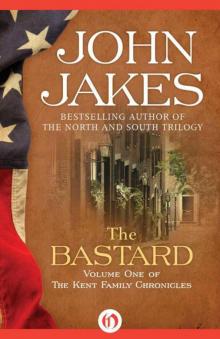 The Bastard
The Bastard The Furies
The Furies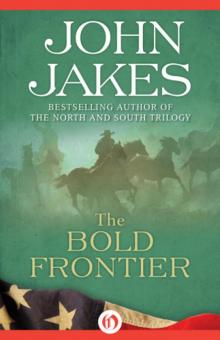 The Bold Frontier
The Bold Frontier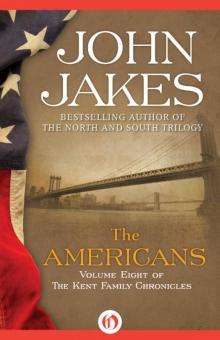 The Americans
The Americans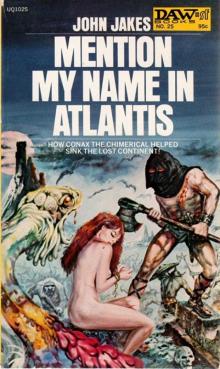 Mention My Name in Atlantis
Mention My Name in Atlantis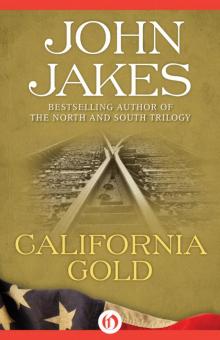 California Gold
California Gold North and South
North and South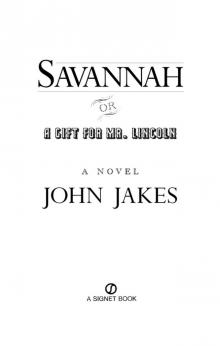 Savannah, or a Gift for Mr. Lincoln
Savannah, or a Gift for Mr. Lincoln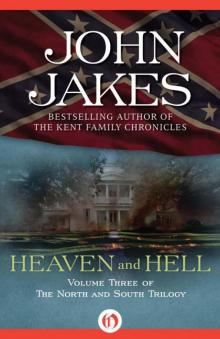 Heaven and Hell
Heaven and Hell Homeland
Homeland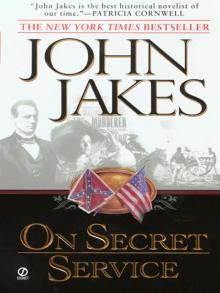 On Secret Service
On Secret Service The Lawless
The Lawless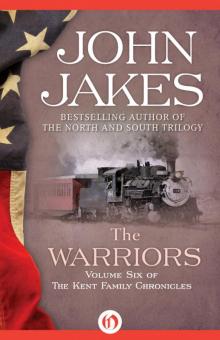 The Titans
The Titans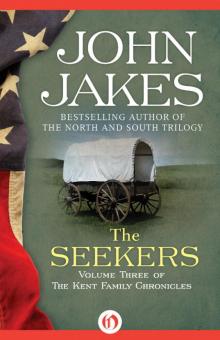 The Seekers
The Seekers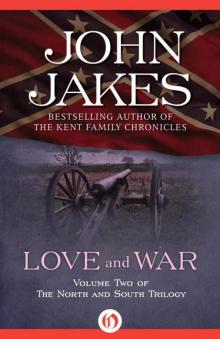 Love and War
Love and War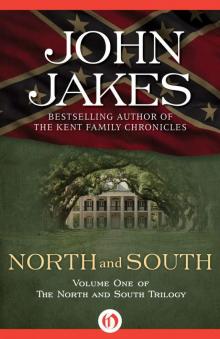 North and South: The North and South Trilogy (Book One)
North and South: The North and South Trilogy (Book One)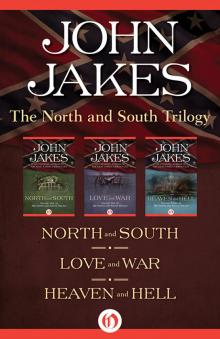 North and South Trilogy
North and South Trilogy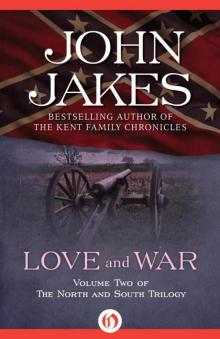 Love and War: The North and South Trilogy
Love and War: The North and South Trilogy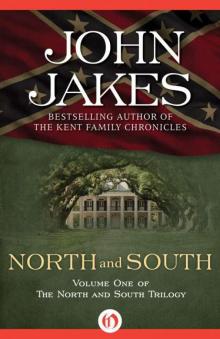 North and South: The North and South Trilogy
North and South: The North and South Trilogy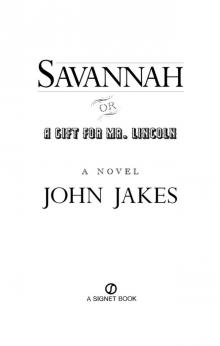 Savannah
Savannah Lawless
Lawless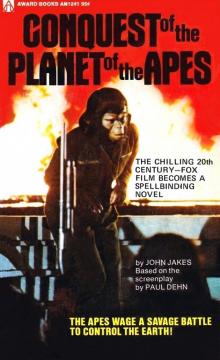 Conquest Of The Planet Of The Apes
Conquest Of The Planet Of The Apes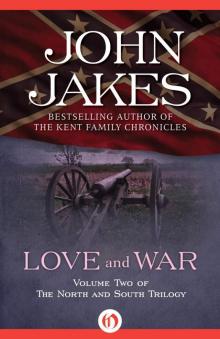 Love and War: The North and South Trilogy (Book Two)
Love and War: The North and South Trilogy (Book Two)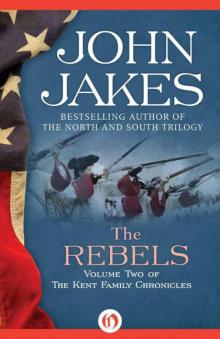 The Rebels: The Kent Family Chronicles
The Rebels: The Kent Family Chronicles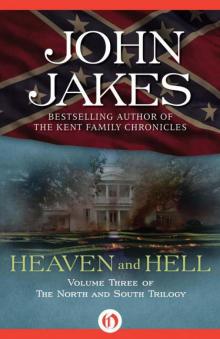 Heaven and Hell: The North and South Trilogy
Heaven and Hell: The North and South Trilogy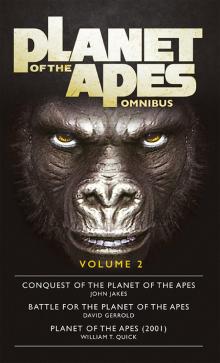 Planet of the Apes Omnibus 2
Planet of the Apes Omnibus 2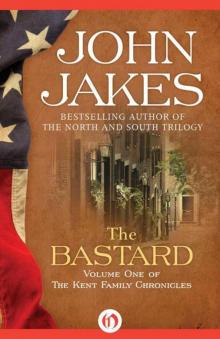 The Bastard: The Kent Family Chronicles
The Bastard: The Kent Family Chronicles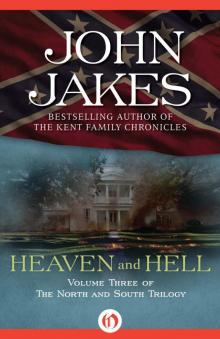 Heaven and Hell: The North and South Trilogy (Book Three)
Heaven and Hell: The North and South Trilogy (Book Three)